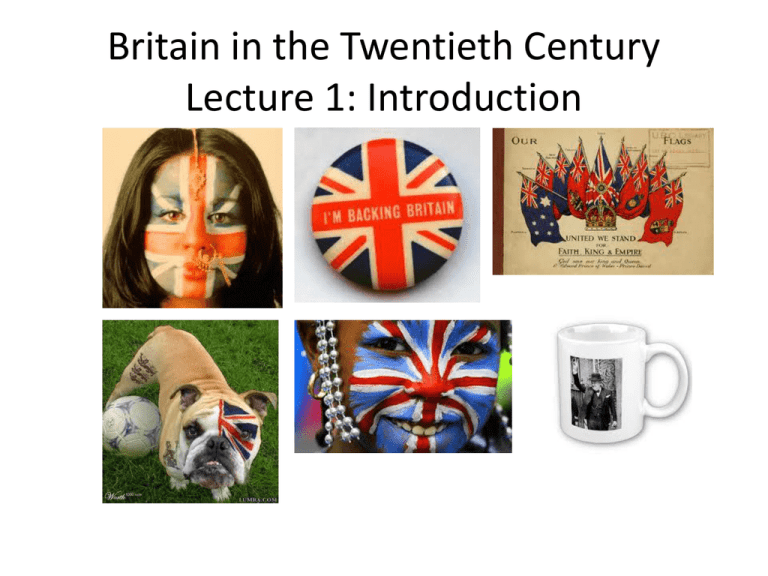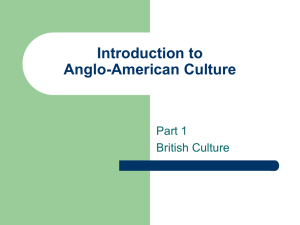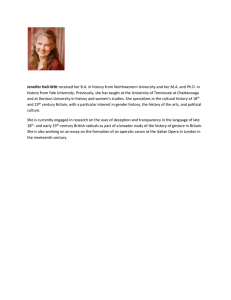Britain in the Twentieth Century Lecture 1: Introduction
advertisement

Britain in the Twentieth Century Lecture 1: Introduction Introduction 1. What is the module about (and why) 2. Practical details, and what lies ahead 3. Initial orientation points: making and unmaking the nation 1. What is the module about (and why) • History moving forward: research-led teaching; teaching-led research What is the module about (and why) • History moving forward • The problem of writing national history What is the module about (and why) • History moving forward • The problem of writing national history • The national question particularly pertinent in a history of twentieth-century Britain (decline; living in an old country; imperial ascendancy and post-colonialism; the four nations question …) four nations or one? kingdoms, states and nations • Distinct entities; separate histories; when does a state or kingdom become a nation? • 1536-43: formal union of England and Wales • 1603: James VI of Scotland assumes crown of England as James I: ‘Great Britain’ • 1707: union of the kingdoms as single state. • 1800: Act of Union merges Ireland with Great Britain • 1922: Irish Free State • Today: no state of ‘Britain’, rather ‘The United Kingdom of Great Britain and Northern Ireland’ What is the module about (and why) • History moving forward • The problem of writing national history • The national question particularly pertinent in a history of twentieth-century Britain (decline; living in an old country; imperial ascendancy and post-colonialism; the four nations question …) • History’s relationship to the present living in an old country an island state English nationalism Scottish nationalism the new patriotism new Britain one nation? 2. Practical details and what lies ahead • Module Structure: Chronology; Making and Un-Making the Nation • Lectures • Seminars • Assessment and Feedback • Resources 3. Initial orientation points: making and un-making the nation the nation is made • ‘There is no more effective way of bonding together disparate sections of restless peoples than to unite them against outsiders’ (Eric Hobsbawm, Nations and Nationalism since 1780 (1990), p. 91). Role of the ‘other’ eg Edward Said, Orientalism • ‘Since 1780’: enlightenment, revolution, will of the people, democracy • Role of communications, vernacular language, print revolution in imagining the nation (Benedict Anderson, Imagined Communities, 1983). • Role of the state in mobilising and unifying nation • Capitalism/industrialisation: breaking down localism. • ‘Britain’/’Britishness’ (rather than English/Scots/Welsh/Irish) as new as identity of USA? … nations can be unmade • The ongoing and increasingly revolutionary processes of capitalism are now radically restructuring and remodelling the nations they conjure into existence, eliminating some, transcending some. The British nation and the British state are clearly entering a process of dissolution, into Europe or the mid-Atlantic, or a post-imperial fog. Britain has begun its long march out of history (Gwyn Williams, When was Wales? (London, 1979), p. 6). • Richard Weight, Patriots: National Identity in Britain 19402000 (2002): in this period, people of Britain shift from seeing themselves as British to English, Scots, Welsh. forging the British nation • Linda Colley, Britons: Forging the Nation, 1707-1837 (1992) • 1707 Act of Union joining England and Wales with Scotland • War with France: 1689-1697; 1702-1713; 1743-1748; 1756-1763; 1778-1783; 17931802; 1803-1815 • 1837 coronation of Victoria and era of peace forging the nation • Effect of virtually constant war: common experience; fruits of victory. • Identification against ‘other’ of French enemy and its supposed values of militarism and lack of freedom • Identification against ‘other’ of Catholicism (of continent and Ireland). • Identification against colonial people conquered. • Patriotism a rational response ‘a way of claiming the right to participate in British political life’ (Colley, p. 5). but … fragility of the nation? • Britishness does not replace other identities whether of region or country, such as Scottishness (lowland/highland) or Welsh, rather it is superimposed. • Victorian era one of relative peace in Europe • Protestantism/Anti-Catholicism less virulent? • Nationalism happens elsewhere? • Invention of tradition – Gaelic and Celtic culture advances Irish/Scots/Welsh identity holding Britain together • Role of Empire remains important in 19th century via migration (peak 4.4m 1900-09), trade, and culture: talk of ‘Greater Britain’ • Role of history as a subject that takes nation as dominant frame. 1870s on takes on from classics to provide moral guide for future leaders and instil /national character. Also in schools. • Increased communications and role of state as force of unity; continuity to 20th C via Welfare State and BBC • Role of Germany as ‘other’ in WWI and WWII • Role of Europe as ‘other’ • Independence for Southern (Catholic) Ireland in 1922 (case of Britishness failing) not followed by break-up of Britain: settles four nation question for time being un-forging Britishness in the 20th century? • Rise of class consciousness; challenge to ‘one nation’ • No ‘other’ after WWII (remains a focal point for British national identity) • From 1970s (discovery of North Sea Oil; economic decline; rise of nationalist movements in Scotland and Wales) and 1990s (opening up of constitutional issue; increasing importance of supranational European Union), process of devolution of power to Scotland and Wales. • American culture resisted but increasingly dominant; erosion of national culture? • Postwar rapid end of Empire • Postwar immigration from former colonies; multi-culturalism • Heritage culture: nostalgia and commodification of past national identity and ethnicity in Britain, 2005 • Majority in non-White ethnic groups describe themselves as either British, English, Scottish or Welsh, eg. 75% in Indian, 80% in Pakistani, Bangladeshi and Black Caribbean, and 88% in Mixed group. • White British group more likely to call themselves English (58%) rather than British (36%). • Non-White more likely to identify themselves as British, eg 76% of Bangladeshis compared to 5% responding English, Scottish, or Welsh • Source: http://www.statistics.gov.uk/cci/nugget.asp?id






